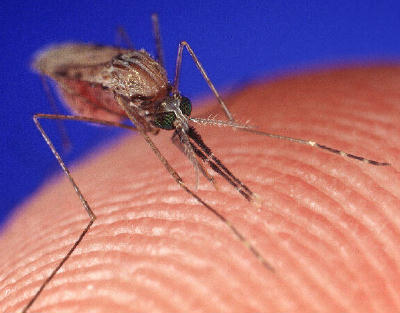April 17, 2006
The Best Way to Repel Insects and the Diseases They Carry: DEET!
By Michael D. Shaw
With the arrival of spring, and the upcoming summer vacation season, an ancient foe is also back: those awful pests that leave us covered in bites, itching, scratching, and searching (sometimes in vain) for an effective treatment. Yes friends, one of God’s least favorite creatures—the mosquito—has returned, yet again, to torment us. Despite all efforts to manufacture a magic potion that will forever eradicate these mini-monsters, these true-life vampires have consistently defeated the best efforts of modern science.
Among insects, as one commentator put it, mankind is in the losing column. But there is one chemical, DEET [N,N-diethyl-m-toluamide (also known as N,N-diethyl-3-methylbenzamide)], that is highly effective at keeping mosquitoes, flies, fleas, and ticks at bay. Never forget that these insects are carriers of some undeniably serious—even lethal—conditions, including West Nile virus, encephalitis, malaria, dengue fever, Rocky Mountain spotted fever, and Lyme Disease. And yet, a small but highly vocal group of extremists wants to ban DEET, despite its proven safety and undeniable success.
Never mind statements by both the Environmental Protection Agency (EPA) and Centers for Disease Control (CDC) that DEET is absolutely safe: logic and facts will not persuade these critics of anything. Instead, they circulate false stories about DEET’s alleged toxicity and overall danger—all of which serve only to cause more human suffering.
Ever since the US Department of Agriculture developed DEET in 1946, this chemical remains the best means of keeping a wide range of insects at a safe distance. In fact, a study published in the New England Journal of Medicine examined 15 volunteers at the University of Florida who placed their arms into a cage full of underfed mosquitoes, after applying one of 13 different kinds of insect repellents and three repellent wristbands. The results were irrefutable: DEET-based products claimed the top three spots; no citronella product and no commercial spray with the bug-repelling chemical IR3535 worked for more than an hour.
Listen to Mark Fradin, a dermatologist at the University of North Carolina, who led the study:
“I think that if you’re looking for the insect repellent that’s going to last the longest, you’re not going to find many people who will say anything is better than DEET.”
Sadly, extremists want to ignore these results and summarily remove DEET from the marketplace. They cite 14 potentially DEET-related seizures over 40 years as proof that the chemical is dangerous. Put this into perspective. Consider the tens of millions of people who use insect repellents each year, nearly all of which contain some measure of DEET, and the best the opponents can do is tout a scant 14 potential cases of dangerous side effects in 40 years! By that calculus, aspirin is far more dangerous than DEET. Even the American Academy of Pediatrics now says that DEET can be used safely for adults and children over two months old. Indeed, you can apply a product containing up to 30% DEET on such young children.
As in other mishaps concerning the use of chemicals deemed safe by both the EPA and CDC, serious reactions to products containing DEET have been related to misuse such as swallowing, applying over broken skin, and using for multiple days without washing skin in between use. Simply stated, some people refuse to follow the instructions on the product label, which leads to a handful (emphasis on handful) of incidents where ill effects may occur. We would advise and warn you to not spray these repellents directly on your face, or not to use this chemical excessively when a small dose will work just as well. In short, use common sense.
No product provides as much lasting relief from mosquitoes and other insects as DEET. Notwithstanding a few isolated cases, this chemical is safe, proven, and reliable. It remains, even in the face of marked changes in science and technology, the best and most affordable weapon against carriers of West Nile virus and other serious conditions. Critics who seek to ban DEET are terribly misguided and just plain wrong. The majority of pediatricians, health officials, and scientists agree: DEET works.
Enjoy the great outdoors.

